8 reasons why Peppa Pig is the worst
Kids absolutely love the obnoxious Peppa, while parents disagree
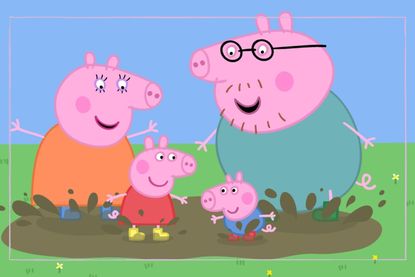

Your children likely love the muddy puddle jumping pig, but parents aren't so sure about the sometimes obnoxious Peppa.
Peppa Pig has now amassed a total of 381 episodes and been translated into over 40 languages worldwide. She's spawned her own theme park and a huge range of merchandise, making the bright pink character a household name and one of the most popular children's cartoons ever to land on TV screens. However, she's also sparked concerns about behavioural issues, with mums and dads all over the web displaying mixed opinions on the nation's favourite pig.
Parents are concerned whether the show teaches kids bad behaviour or just showcases a character with a LOT of personality - but frankly, we're not going to play devil's advocate with this one. GoodTo.com Family Editor Stephanie Lowe, admits she was never a fan of Peppa. She said "Luckily my son was more of a Paw Patrol lover, we side stepped Peppa Pig. I'm glad about that, I know not all kid's cartoons get it right, but Peppa seemed to get it wrong more than right."
With this in mind, here are the top reasons why Peppa Pig sometimes, well, sucks - and we bet you agree with more than you expect!
Reasons Peppa Pig is bad
1. Her endless fat-shaming of poor Daddy Pig
Not only did Peppa make the password to her secret tree house "Daddy's Big Tummy", she's always calling him fat or screeching "SILLY DADDY!"
Even when Daddy Pig starts exercising and tells his daughter that he's 'naturally fit', she undermines him by by saying "You don't look very fit - your tummy is big!"
Parents have even complained that it's made their children less sensitive to others, with one mum writing on Twitter: "It's caused my toddler to tell everyone they have 'big daddy pig tummies,'" which is not a body positive message for young children to learn.
GoodtoKnow Newsletter
Parenting advice, hot topics, best buys and family finance tips delivered straight to your inbox.
GoodTo.com Family Editor Stephanie Lowe, has spoken about this very issue in relation to her own experience, saying "I especially didn't like the scene where Peppa bullies Daddy Pig for his weight... erm, hello body positivity movement. Yeah, that didn't age well."
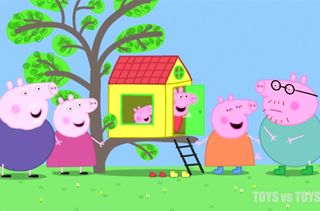
2. Her habit of jumping in muddy puddles
We know she's a pig, and that's what pigs do, but it's also now what our kids do on EVERY SINGLE WET SCHOOL RUN, so thanks Peppa. Thanks a bunch.
One mum sarcastically wrote on Twitter about this issue, saying "My daughter loved jumping in 'muddy puddles' thanks to Peppa. It was especially fun when she did it when we were all dressed up about to head out."
Another added "Nothing like the day my toddler spilled her chocolate milk and proceeded to jump in it and yell 'jumping in muddy puddles mummy.' We never watched Peppa Pig again."
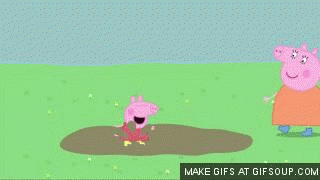
3. Her incessant whinging when she loses a game
We don't really want to be teaching our kids how to be a really sore loser... Let's not give them more to moan about, eh?
Parenting expert Dr Karen Phillip has spoken about this very issue, recently warning parents of the dangers of leaving a child to sit and watch non-educational television programmes and how they influence feelings; she suggests shows like Peppa can have a detrimental affects on their behaviour.
"Kids are losing the capability of developing skills in empathy and reading other people's body language because they're so not in tune with it anymore," she said.
Instead of encouraging children to become angry if they lose, teaching resilience is important. Building resilience can help children adapt to many diverse situations and possible future stressors. It can also help them manage stress, anxiety and uncertainty. Peppa on the other hand, insinuates that situations can be altered or managed with negative behaviour.
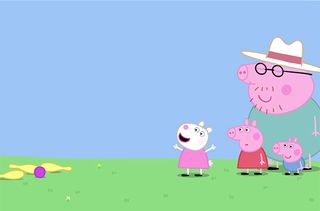
4. Her blatant rudeness when it comes to her friends
Feeling upset at her inability to whistle, Peppa phones friend Suzie Sheep to chat about it. When Suzie thinks she too is unable to whistle, Peppa is openly gleeful. When it transpires Suzie can actually do it, Peppa simply hangs up the phone on her friend.
Although competitive behaviour and the need to be "better" than others can sometimes be a good thing, children should still be taught kindness and to value the achievements of others. Peppa's complete disregard for her friend achieving something she can't, is neither kind or positive. Teaching children to be kind, has been proven to shape their future success more than being competitive.
5. Her overuse of the word ‘yuk!'
We now hear it in response to everything: dinner, our faces first thing in the morning, the state of the car... Enough is enough and we don't want to hear "Yuk" anymore!
Joyful Toddlers suggest that we simply can't just tell children "Don't say yuk." They say "We all think with imagery, and children even more than adults. If I say, 'Don’t run in the street,' what’s the image that comes into your head? Now, how about if I say, 'Please walk straight along the sidewalk.' The word 'don’t' is a modifier that is very weak compared to the strong image created by the rest of the phrase. This is why, if you say 'Don’t jump in the puddle,' the average two-year-old will go directly to the puddle and jump in it, and be slightly puzzled as to why you’re annoyed."
Instead, we can equip children with different words and phrases, such as "I'm not fond of," or "No thank you," or any alternatives that sound more polite and positive than a simple "Yuk".
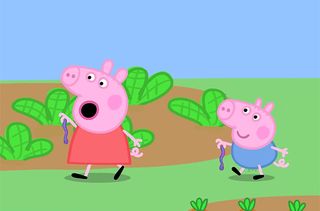
6. Her other charming catchphrase, 'I don't like you any more, you're not my best friend'
This teaches kids how to drop their best friends in a heartbeat, so all those playground tiffs you keep hearing about, can probably be blamed on her too. Light-heartedness aside, this sort of behaviour can be very toxic and damaging to children, yet appears to be perpetuated by generation after generation.
Mum-of-one Lucy says "I was on the receiving end of many threats of 'you're not my friend anymore' and being pushed from friendship circles without a backwards glance. The fact that I still have clear memories of this decades later, shows just how much of an impact it can have."
She continued "I still see similar patterns of behaviour in grown women collecting their children from school, and it saddens me this still continues apparently as a lifelong issue among women."
Let's break that cycle, and teach children that how Peppa handles spats with friends and other children is completely wrong.
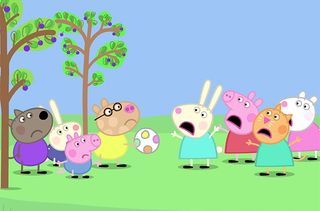
7. She's such a mean older sister
Poor little George Pig is always being excluded from his sister's games when she's got a friend over, and she keeps telling him he can't do things JUST because he's little. You can do anything, George! Don't let her get you down. And maybe stop demanding chocolate cake and squealing 'wahh' all the time. Just a suggestion.
It seems difficult to expect our children to be kind to their siblings and act positively around each other, if their first influences can't get that right. On Twitter, one parent wrote "The biggest problem I have with 'Peppa Pig' is the characters. They (mainly the title character and a number of the child characters) never seem to grow, improve or learn anything or get any repercussions for bad behaviour."
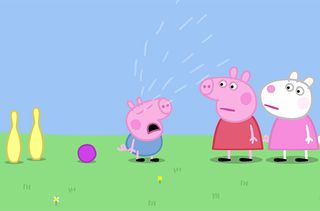
8. That. SNORT.
It's bad enough that we have to hear the entire Pig family snorting every other minute, but once your child starts developing it as a second language? It's almost worse than nails on a chalkboard.
On a positive note, each animal does a fairly good effort at making the noise their real counterpart would make - Suzie likes to "baa" loudly at the beginning of every conversation. There could be something in there children can take home about linking animals with the correct noise they make, but that could also be a stretch with us clutching at straws to find a positive in the series...
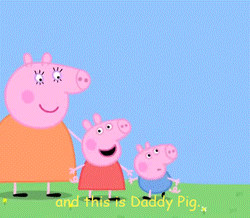
What can my kid watch instead?
Bluey - There are so many positives to find in Bluey, it's difficult to know where to start. Apart from being full of humour and easy for parents to watch, the whole dynamic is very different from Peppa Pig. The show has a community feel, depicting life outside of the family unit and how positive these interactions can be. For any mum feeling the drudgery of domesticity, Bluey portrays these tasks as something to be shared (not solely handed to mum) and how they can be made fun.
Bing - Ok, some people have said they find Bing a bit whingey. However, unlike Peppa's whingeing and bad behaviour going unchecked, the other characters take on board what Bing is unhappy about. Each episode at least charts some emotional growth, and recognition and appropriate response to difficult emotions.
Sarah & Duck - Sarah lives with her best friend, who happens to be a duck. Like Bluey, the episodes can depict some mundane scenarios. Unlike Peppa, Sarah and her Duck find solutions to everyday problems, and include external characters in any ensuing adventures. Devoted to her Duck, the show delivers on teaching empathy, acceptance, and patience.
Hey Duggee - Also bringing huge heart, the wit and charm of Hey Duggee puts it as a top front runner to replace Peppa. Follow five animal children at their pre-school, as they problem solve to earn badges. Similar to an anthropomorphic Cubs group, the animals complete their tasks with the sort of skills you hope your children will develop. There's also clever references to an array of wider cultures thrown in, and adults are guaranteed to laugh loudly at least once per episode.
Should you decide to give Bluey a go, be aware of fake Bluey episodes on YouTube, as they're inappropriate for youngsters to see. Julia Donaldson's classic books can be found in animated form on iPlayer, and these are always a sure win with children. The Numberblocks animated series is also on iPlayer, for something extremely educational.
Video of the Week

Lucy is a mum-of-two, multi-award nominated writer and blogger with six years’ of experience writing about parenting, family life, and TV. Lucy has contributed content to PopSugar and moms.com. In the last three years, she has transformed her passion for streaming countless hours of television into specialising in entertainment writing. There is now nothing she loves more than watching the best shows on television and sharing why you - and your kids - should watch them.
-
 Why do babies need to lie flat in a pram?
Why do babies need to lie flat in a pram?Wondering why babies need to lie flat? Experts reveal all — plus whether or not a baby should sleep in a pram
By Charlotte Duck Published
-
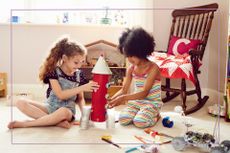 The 3 stages of play every parent needs to know to save their sanity (and you're probably nailing #2)
The 3 stages of play every parent needs to know to save their sanity (and you're probably nailing #2)By Dr Amanda Gummer Published
